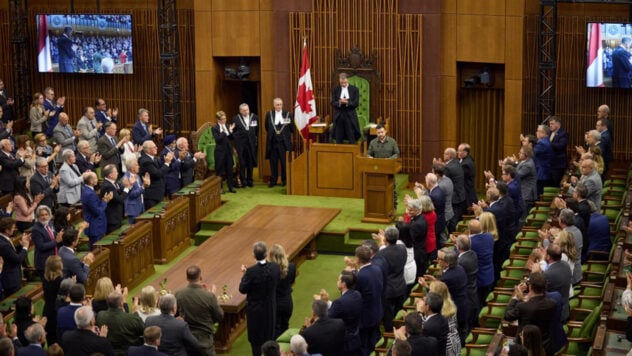A political scandal erupted in Canada over the honoring at a parliamentary meeting of a Ukrainian who served in a German unit during the Second World War.
According to the BBC, the incident occurred on September 22, during a ceremonial meeting of the Canadian Parliament on the occasion of the visit of Ukrainian President Vladimir Zelensky.
The gallery in the parliamentary hall was attended by 98-year-old Ukrainian Yaroslav Hunka . Speaker of the House of Commons of Canada Anthony Rota at one point called attention to him, saying that the man “was a Ukrainian hero, a Canadian hero, and we thank him for all his service.” After this, those present rose from their seats and began to applaud.
Now watching
At that moment, Vladimir Zelensky and Canadian Prime Minister Justin Trudeau were in the parliament hall.
Political scandal in Canada
The problem is that during World War II Jaroslav Hunka served in the 14th Grenadier Division of the Waffen-SS (also known as the Galician Division).
Hunka's presence in Canadian Parliament respondedThe Canadian Jewish organization CIJA. They stated “deep concern” regarding the greeting of a veteran of the Galicia division. The organization insists that this unit participated in the genocide of Jews.
Prime Minister Justin Trudeaualso commented on Jaroslav Hunka's invitation to parliament, calling it “deeply embarrassing”. At the same time, he did not call on Anthony Rota to resign.
– It is very disappointing that this happened. The speaker admitted his mistake and apologized. But this is deeply embarrassing for the Parliament of Canada and, as a result, for all Canadians, Trudeau said.
The leader of the opposition Conservative Party of Canada, Pierre Poliev, said Trudeau also bears responsibility for the incident, calling on him to apologize. However, the prime minister's office responded that the decision to invite Hunka was made solely by the speaker's office. Neither the Prime Minister's office nor the Ukrainian delegation were notified of this in advance.
Meanwhile, members of parliament began calling on the Speaker of the House of Commons to resign.
– It is shocking that members of parliament rose to applaud him (Jaroslav Hunka, — Ed.). Members did this because we believed the speaker's word that this man really should be given this honor,” said House of Commons member Peter Julian.
Poland's reaction
Polish Ambassador to Canada Witold Dzielski reacted to the incident. He demanded an apology for the appearance of a veteran of the Galician division in the Canadian Parliament.
Dzielski named Jaroslaw Hunka as a member of the “infamous Ukrainian military formation during World War II, responsible for the murder of thousands of Poles and Jews.”
– Poland is the best ally Ukraine has, but it never will not agree to whitewash such villains. As the Ambassador of Poland to Canada, I expect an apology,” Dzielski wrote on the social network X (formerly Twitter).
Speaker's apology
Speaker of the House of Commons of Canada Anthony Rotahas already apologized for honoring Yaroslav Hunka within the walls of parliament. He noted that on September 22, “during his speech after the address of the President of Ukraine, he recognized a man in the gallery”.
– Subsequently, I received additional information, so now I regret my decision, — ; added Rota.
The speaker emphasized that turning to Jaroslav Hunka was only his personal initiative.
“No one, including fellow parliamentarians and the Ukrainian delegation, knew about my intention or my words before I said them. This initiative was entirely mine… I accept full responsibility for my actions,” Rota explained.
He also apologized to the Jewish communities of Canada and around the world.
In response, CIJA said it “appreciate the apology”. They also called for a review to “ensure that such an unacceptable incident does not happen again”.
< strong>What is known about the Galicia division
This is one of the most controversial pages in the history of Ukraine.
The 14th Waffen-SS Grenadier Division Galicia was a volunteer unit that existed in 1943- 1945 and was staffed primarily by ethnic Ukrainians. The division was part of the Waffen SS troops of Nazi Germany.
In April 1945, the re-equipped unit received a new name: the First Ukrainian Division of the Ukrainian National Army.
The Galicia division was accused of killing Polish and Jewish civilians. At the same time, the Nuremberg Tribunal did not find this unit guilty of any war crimes.
As Dominique Harel, head of the department of Ukrainian studies at the University of Ottawa, noted in a comment to Canadian media, the Galicia division attracted thousands of Ukrainian volunteers, many of them who joined it with the hope that they could win the independence of Ukraine.

